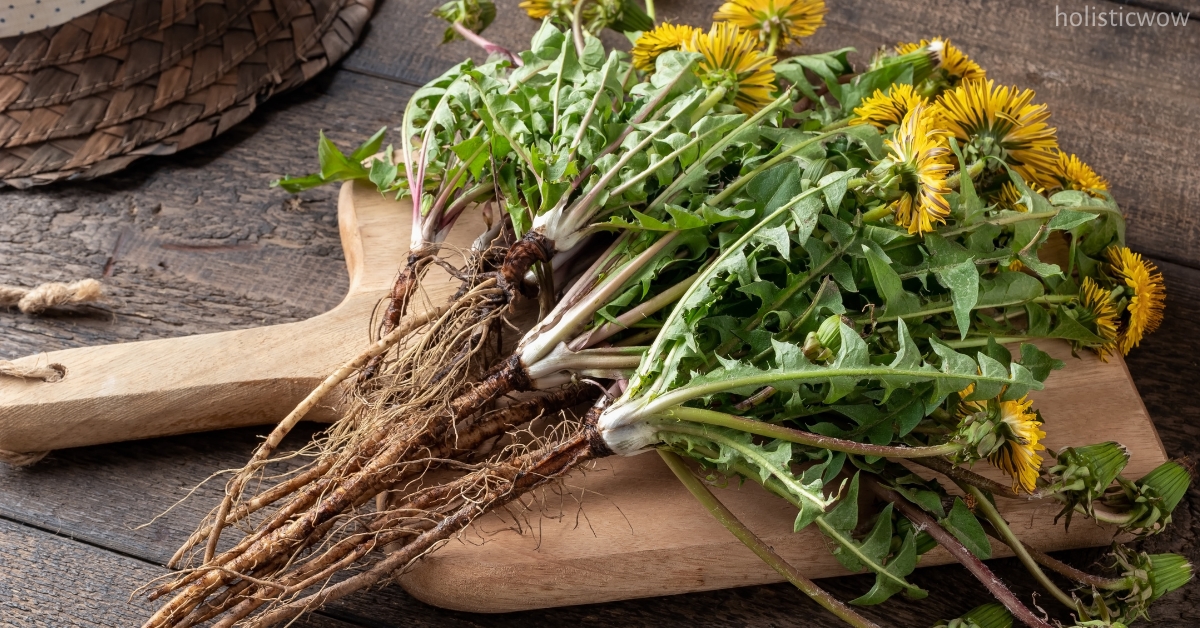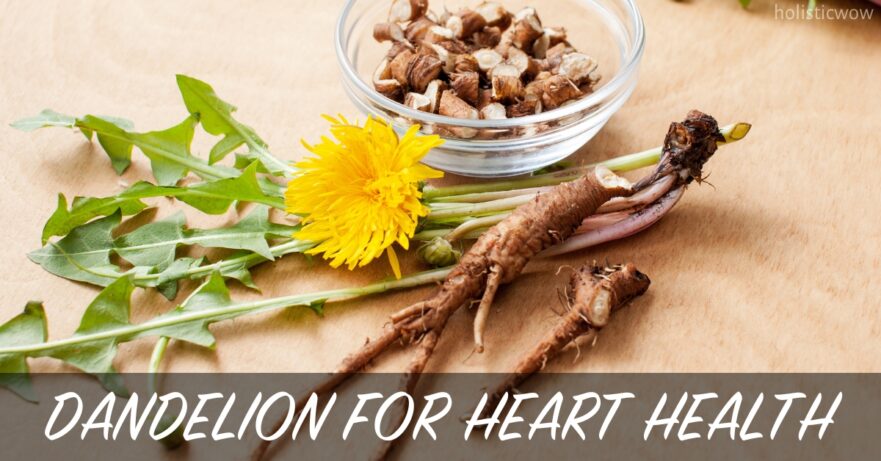What Are the Heart Health Benefits of Dandelion?
Dandelion may offer several potential heart health benefits.
Research suggests that it could help support healthy lipid metabolism, which includes cholesterol and triglyceride regulation, both of which are important factors in reducing the risk of cardiovascular diseases (CVDs).
Some studies indicate that dandelion contains bioactive compounds with antioxidant and anti-inflammatory properties, which may help lower systemic inflammation and oxidative stress, both of which are linked to heart disease.
Additionally, dandelion provides valuable micronutrients, as it is rich in vitamins and minerals such as potassium and polyphenols, which support overall cardiovascular health.
While these findings are promising, clinical human trials are needed to confirm the full extent of dandelion’s heart-protective effects.
Key Takeaways
- ❤️ Heart Health Benefits: Dandelion may support heart health by helping regulate cholesterol and triglyceride levels, potentially reducing the risk of cardiovascular diseases.
- 🌿 Natural Antioxidant Properties: Rich in antioxidants and anti-inflammatory compounds, dandelion can help lower systemic inflammation and oxidative stress, which are linked to heart disease.
- 🍃 Nutrient-Rich Support: Dandelion is a valuable source of vitamins and minerals like potassium, which is important for blood pressure regulation and overall cardiovascular health.
- 🫖 Incorporating Into Diet: Dandelion can be enjoyed in salads, soups, teas, or as supplements, providing an easy way to integrate its health benefits into a heart-healthy diet.
How Does Dandelion Support Cardiovascular Health?
Dandelion may potentially support cardiovascular health by modulating lipid metabolism, as suggested by animal and in vitro studies, though more human research is needed.
The antioxidants and anti-inflammatory compounds in dandelion may help protect the heart by reducing oxidative damage and inflammatory markers, both of which are linked to heart disease.
Additionally, its high potassium content may contribute to healthy blood pressure regulation, which is essential for overall cardiovascular function.
While these potential benefits are promising, well-designed human clinical studies are required to validate these effects.

What Antioxidant Properties Does Dandelion Offer for Heart Health?
Dandelion contains powerful antioxidants, particularly polyphenolic compounds such as chicoric acid, that may support cardiovascular health.
T hese compounds help neutralize free radicals, which contribute to oxidative stress—a key factor in chronic inflammation and potential vascular damage.
By reducing oxidative stress, dandelion may help protect endothelial cells and support vascular function.
Research suggests that dandelion extracts may enhance the body’s total antioxidant capacity and lower oxidative stress markers in tissues, including the heart.
While these effects indicate potential cardioprotective benefits, additional clinical human studies are necessary to confirm dandelion’s role in preventing cardiovascular diseases.
However, its natural antioxidant properties make it a nutritionally beneficial addition to a heart-healthy lifestyle.
How Does Dandelion Affect Cholesterol and Triglyceride Levels?
Dandelion may support the regulation of cholesterol and triglyceride levels.
Some animal studies suggest that dandelion can modulate lipid metabolism, which plays a significant role in heart disease and overall cardiovascular health.
Bioactive compounds in dandelion, including flavonoids and hydroxycinnamic acid derivatives, are hypothesized to contribute to these potential cholesterol-lowering effects.
Research indicates that supplementation with dandelion leaf and root has been observed in animal models to lower triglycerides and total cholesterol while increasing HDL (“good”) cholesterol, particularly in subjects following a high-fat diet.
While these findings are promising, clinical human studies are needed to establish dandelion’s efficacy in cholesterol management.
Can Dandelion Help Lower Blood Pressure?
Dandelion may support blood pressure regulation due to its mild diuretic properties and potassium content, which can help balance fluid levels and promote cardiovascular health.
As a diuretic, dandelion can aid in eliminating excess fluid from the body, which could help reduce blood pressure.
Potassium is known to support vascular health, particularly in individuals with hypertension, by helping balance sodium levels and promoting proper cardiovascular function.
While some preliminary studies suggest that dandelion may have cardiovascular benefits, including its potential role in fluid balance and blood pressure modulation, well-controlled human trials are still necessary to confirm these effects conclusively.
If you have hypertension or are taking medications, it is advisable to consult a healthcare provider before using dandelion supplements.

What Is the Cardioprotective Potential of Dandelion?
Dandelion may have cardioprotective effects by helping to reduce oxidative stress, inflammatory markers, and lipid imbalances, which are linked to cardiovascular diseases.
Some animal studies suggest that dandelion extract may help support heart health by lowering total cholesterol and reducing markers of systemic inflammation.
Additionally, dandelion contains polyphenolic compounds, which may contribute to vascular protection and improved endothelial function.
However, more high-quality human research is needed to confirm these potential effects before dandelion can be widely recommended as a cardioprotective agent.

How Can Dandelion Be Incorporated into a Heart-Healthy Diet?
Dandelion can be incorporated into a heart-healthy diet in several ways.
The leaves, roots, and flowers of the dandelion plant are edible and versatile:
- Enjoy dandelion greens raw in salads
- Cook the greens in soups, stir-fries, or sautéed dishes
- Dandelion root can be dried and brewed into herbal tea or used as a coffee alternative
- Supplements containing dandelion extract are available for those who prefer this option
Including dandelion in your meals provides nutritional support and should complement a balanced diet rich in fruits, vegetables, whole grains, and lean proteins.
As with any herbal supplement, it is important to consult a healthcare provider before adding dandelion to your routine, especially if you have existing medical conditions or take medications.
Herbal Preparations and Recipes for Heart Health
Herbal remedies can play a complementary role in promoting heart health. Dandelion, known for its potential role in lipid metabolism and mild diuretic effects, can be effectively used in various preparations. The following recipes utilize dandelion and other beneficial herbs to help maintain cardiovascular well-being.
Always consult a healthcare provider before starting any new herbal regimen, especially if you have existing health conditions or are taking medications.
Dandelion Heart Support Tea
Ingredients:
- 1 teaspoon dried dandelion leaf
- 1 cup of boiling water
Preparation:
- Place the dried dandelion leaf in a teapot or cup.
- Pour boiling water over the herb.
- Steep for 10–15 minutes.
- Strain and drink 1-2 cups daily.
This simple tea harnesses the bioactive compounds in dandelion, which may offer antioxidant and mild diuretic properties, as well as potential benefits for lipid metabolism.
Warnings : Dandelion may interact with certain medications, particularly diuretics, blood thinners, and medications that affect potassium levels. Individuals with kidney disorders, gallbladder disease, or allergies to plants in the Asteraceae family should consult a healthcare provider before use.
Heart Health Herbal Blend
Ingredients:
- 1 teaspoon dried dandelion leaf
- ½ teaspoon dried hawthorn berries
- ½ teaspoon dried motherwort
- ½ teaspoon dried nettle leaf
- 1 cup of boiling water
Preparation:
- Combine all the dried herbs in a teapot.
- Add boiling water and steep for 15–20 minutes.
- Strain and drink 1 cup once or twice daily.
This herbal blend combines the potentially heart-supportive properties of dandelion with hawthorn, which has been studied for its role in improving circulation and supporting heart function, motherwort, which may help regulate heart rhythm and provide calming effects, and nettle, which contains micronutrients that support cardiovascular function.
Warnings : Hawthorn has been studied for its effects on blood pressure and heart function, and may interact with prescription heart medications, including beta-blockers and blood pressure-lowering drugs. Motherwort can affect hormone levels and may not be suitable for pregnant women or individuals with thyroid disorders. Nettle may cause allergic reactions in some individuals and can interact with anticoagulants (blood thinners), blood pressure medications, and diuretics.
These herbal preparations aim to support cardiovascular wellness through their potential antioxidant, lipid-modulating, and anti-inflammatory properties. However, they should not replace conventional medical treatment for heart conditions. Always consult a healthcare provider before starting any new herbal regimen, particularly if you have existing health conditions or are taking medications.

